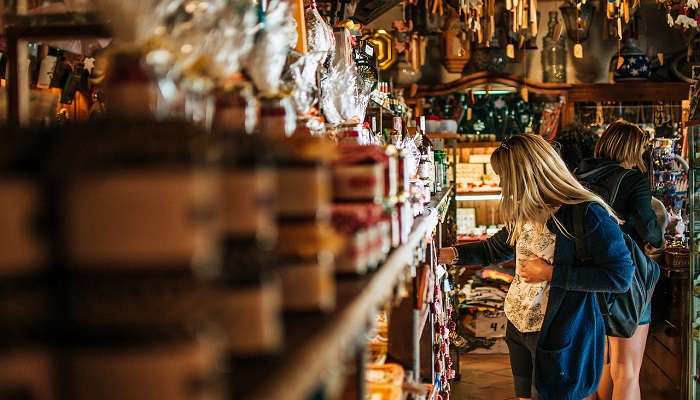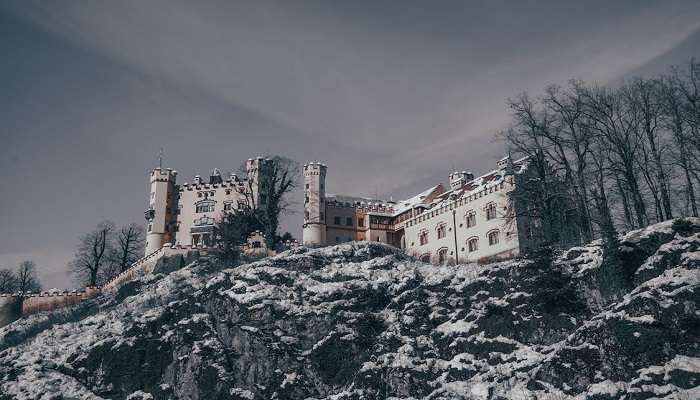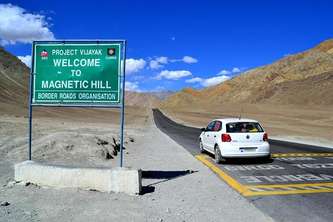Plan A Trip To Visit The Viktualienmarkt In Munich In 2026
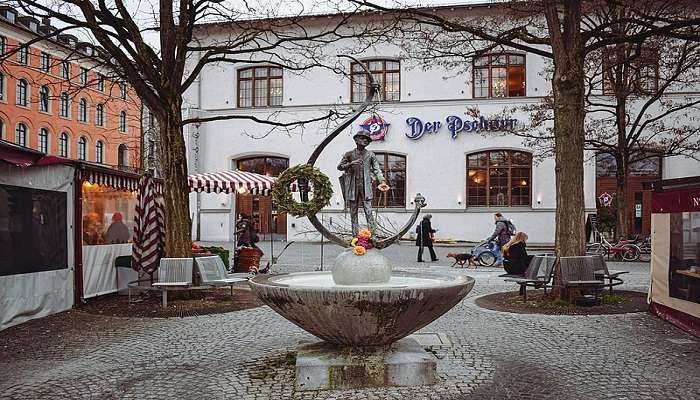
Located in the heart of Munich, Viktualienmarkt stands as a testament to Bavarian culinary culture. This bustling open-air market has been a cornerstone of Munich’s food scene since 1807, evolving from a simple farmers’ market to a gourmet paradise. Spanning 22,000 square meters, Viktualienmarkt boasts over 140 stalls offering an array of fresh produce, artisanal goods, and local delicacies. From colourful flower stands to aromatic spice merchants, the market is a feast for the senses. Whether you’re a food enthusiast, a curious traveller, or a local seeking the finest ingredients, Viktualienmarkt promises an unforgettable experience that captures the essence of Munich’s rich gastronomic heritage.
About Viktualienmarkt
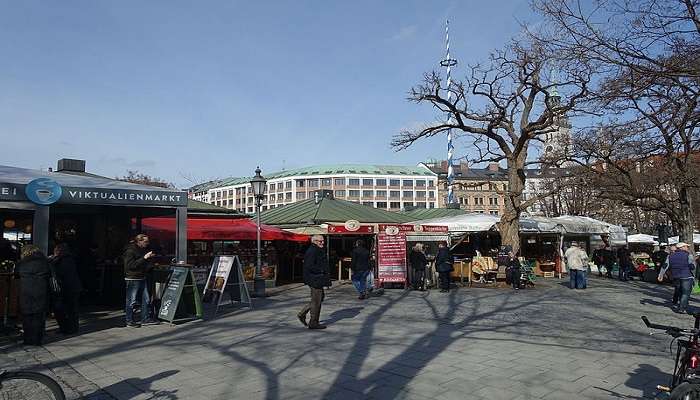
The Viktualienmarkt is a food market and square in the centre of Munich, Germany, that has existed since 1807. What started as a farmers’ market has now developed into an iconic shopping centre for residents and visitors.
The market has over 140 stalls and shops where one can find fresh vegetables and fruits, spices, flowers, cheese, fish, and many others. The name Viktualienmarkt is derived from the Latin word Viktualien, which means food, underlining its history as a market for food products. Besides shopping, the market is a cultural centre with well-illuminated fountains and a maypole and is, therefore, a must-visit place in Munich.
Also Read: Museums In Frankfurt
History Of Viktualienmarkt
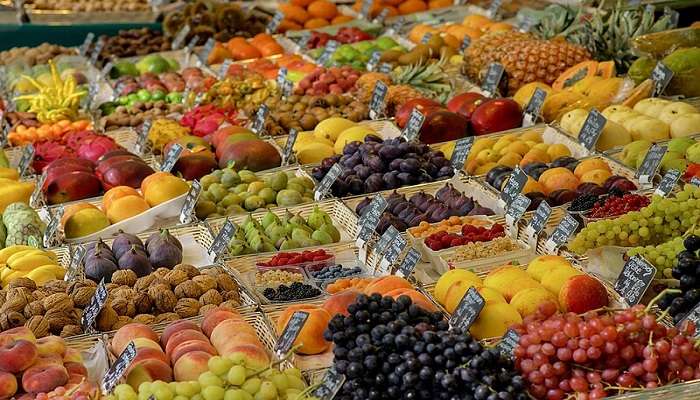
It was in 1807 that Viktualienmarkt was founded. It was founded in 1515 by the decree of king Maximilian I, who decided to move the market from Marienplatz to the place between Heiliggeist Church and Frauenstraße. This was a wise decision because the initial market was no longer large enough to contain the increasing business of cereals and other agricultural produce. The new market was first called the “green market” and later – Viktualienmarkt, which comes from the Latin word “victuals,” meaning food.
Viktualienmarkt has been expanded and added with some structures and buildings over the years. Between 1823 and 1829, the market was expanded considerably. In 1852, the Schrannenhalle, a precursor to today’s Großmarkthalle, was built near the ancient city wall but was destroyed by fire in 1932 and later rebuilt in 2005. The fish market was moved to Westenriederstraße in 1855, and various other halls and pavilions were added for butchers, bakers, fruit vendors, and fishmongers.
Present day, Viktualienmarkt is a lively and popular market that offers a wide variety of fresh foods, fine delicacies and original Bavarian cuisines. It has become a famous place among the inhabitants of Munich and tourists who visit this city. Even in 2009, New York Times food critic Mimi Sheraton wrote about the market in her article, calling sausages a meal worth a plane trip across the Atlantic.
Things To See At Viktualienmarkt
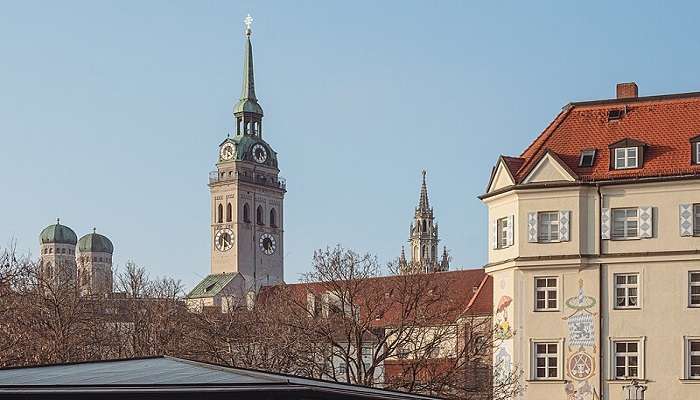
Viktualienmarkt is known for its vibrant atmosphere and diverse offerings. Here are some things to see and experience at Viktualienmarkt:
- Market Stalls: With around 100 stalls, you can find everything from fresh fruits and vegetables to meats, cheeses, spices, and delicacies. It’s a paradise for food enthusiasts, offering a vibrant and diverse selection of local and international produce, perfect for culinary exploration.
- Beer Garden: Munich’s most central beer garden is located here, where you can enjoy beers from all six Munich breweries in rotation. It’s a great spot to relax and soak in the local atmosphere, with ample seating and a lively, welcoming environment.
- Heilig Geist Church: This magnificent church is a must-see. Its beautiful architecture and serene ambience perfectly contrast the lively market. The church’s intricate design and peaceful interior offer a moment of tranquility amidst the bustling surroundings.
- Figurine Fountains: As you stroll through the market, you’ll come across several charming fountains featuring statues of famous Munich folk singers and comedians. These whimsical fountains add a touch of local culture and history to your market experience.
- Honighäusl: A unique stall dedicated to honey, offering various honey products. It’s located right next to the beer garden, making it a convenient stop for those looking to sample and purchase high-quality, locally-produced honey.
- Thoma Fromages et Vines: This stall offers a selection of homemade cheeses and exquisite wines. It’s a great place to sample some local flavours, with knowledgeable staff who can guide you through their offerings and help you find the perfect pairing.
- Café Nymphenburg Sekt: Treat yourself to a glass of sparkling wine and homemade cake at this cosy café. It’s a perfect spot for a sweet break, with a charming atmosphere and delicious treats that make it a favourite among locals and visitors alike.
- Fisch Witte: This stall offers fresh fish from rivers, lakes, and the sea. It’s an excellent place for seafood lovers to pick up some fresh catch, with a wide variety of options and a reputation for quality and freshness.
Related Post: Hindu Temples In Germany
Opening Hours Of Viktualienmarkt?
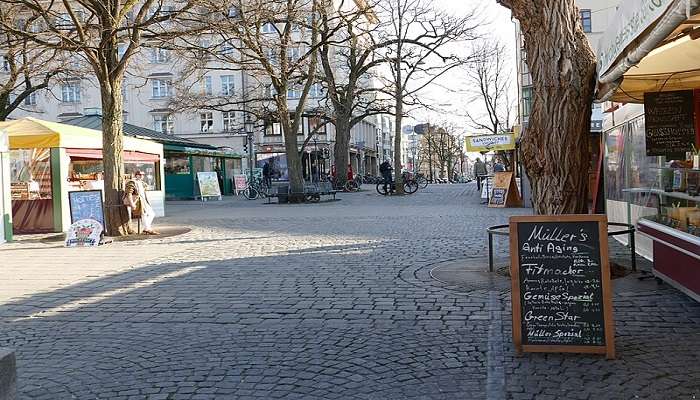
The Viktualienmarkt is a market in Munich that works from Monday to Saturday, mostly from 8 in the morning to 6 in the evening. However, the operational hours of the stalls may vary, and some of them may close early during the winter. It is well known for its fresh fruits and vegetables, exotic and quality food products and mainly for genuine Bavarian food.
Also, the beer garden located in the market is functioning; due to the weather conditions, it operates from 9:00 AM to 10:00 PM. It is a colourful area where people can go shopping, eat out, and have a good time in a colourful environment.
Best Time To Visit
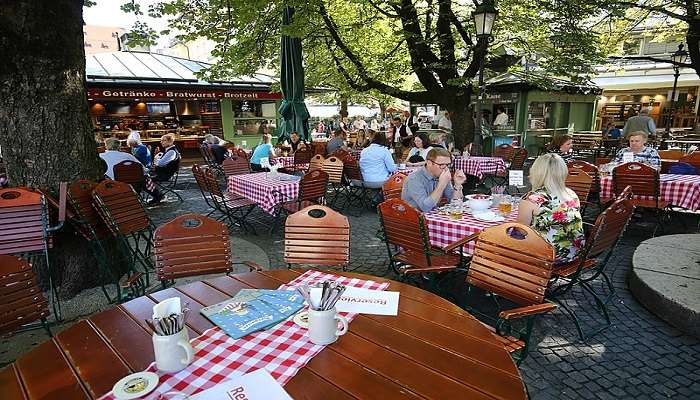
The ideal time to visit Viktualienmarkt in Munich is from late spring to early autumn, particularly between May and September. The weather is delightful during these months, and the market is teeming with activity.
You’ll encounter a lively atmosphere filled with fresh produce, local delicacies, and unique Bavarian items. This period allows you to immerse yourself fully in the outdoor market experience, savour seasonal treats, and enjoy the vibrant ambience of one of Munich’s most cherished markets.
Related Post: Berlin Street Food
How To Reach

To reach Viktualienmarkt, a vibrant and historic market in the heart of Munich, you can choose from several convenient travel options. Here are the various easy-to-reach:
By Air
The nearest airport to Viktualienmarkt is Munich Airport (MUC), about 40 kilometres northeast of the city centre. You can take the S1 or S8 S-Bahn lines from the airport to Marienplatz, which takes about 40 minutes. From Marienplatz, it’s a short walk to Viktualienmarkt. Alternatively, you can take a taxi directly from the airport to Viktualienmarkt, which takes approximately 30-40 minutes, depending on traffic.
By Rail
Munich Hauptbahnhof is the main railway station in Munich, and it is linked to other cities in Germany and other cities across Europe. To Marienplatz, you can take almost any S-Bahn line that passes through the main station and which is cutting through Munich from east to west. From there, you only take a few steps to Viktualienmarkt. Alternatively, one may also use the U3 or U6 U-Bahn lines to Marienplatz. Also, tram lines number 18 and 19 have a stop at Reichenbachplatz, which is only a few minutes’ walk away from Viktualienmarkt.
By Bus
Local buses also provide convenient access to Viktualienmarkt. The bus stop Viktualienmarkt is located on the corner of Rosentalstraße and Prälat-Zistl-Straße, next to the Schrannenhalle. Metrobus Line 52 goes from Sendlinger Tor via Viktualienmarkt to Gärtnerplatz. Several other bus lines also stop near Viktualienmarkt, making it easily accessible by bus.
You May Also Like To Read: Haunted Places In Munich
The Viktualienmarkt is not only a marketplace but also a lively part of the city and the soul of Munich. This historical market is a true treasure trove: fresh fruits and vegetables, exquisite cheeses and meats, energetic beer gardens, and lovely flower sellers. Whether you are a gourmand, a fan of cultures or simply a person who likes the spirit of the local markets, Viktualienmarkt will not remain indifferent. Are you ready to start exploring this world of tasty dishes and learn more about German cuisine? Do not wait any further – book your trip to Europe today and make the Viktualienmarkt a must-visit destination on your itinerary!
For our editorial codes of conduct and copyright disclaimer, please click here.
Cover Image Credit: Flocci Nivis for Wikimedia Commons
Frequently Asked Questions About Viktualienmarkt
How many stalls are there at the Viktualienmarkt?
The Viktualienmarkt in Munich is home to around 140 stalls. These stalls offer a wide variety of fresh produce, meats, cheeses, spices, and other specialities. It’s a vibrant and bustling market, perfect for food enthusiasts looking to explore local and international flavours.
What is Viktualienmarkt famous for?
Viktualienmarkt is famous for its wide variety of fresh produce, traditional Bavarian foods, and shops selling souvenirs. It also features a lively beer garden and holds historical significance as Munich's oldest farmers' market, making it a cultural hotspot.
What can you buy at Viktualienmarkt?
At Viktualienmarkt, you can buy fresh fruits, vegetables, meats, cheeses, flowers, spices, and exotic foods. Additionally, the market offers traditional Bavarian specialities, baked goods, and souvenirs, making it a one-stop destination for both locals and visitors.
How big is the Viktualienmarkt?
Viktualienmarkt spans about 22,000 square meters and hosts approximately 140 stalls. Its large, bustling atmosphere has made it a Munich institution for over 200 years, offering a vast array of goods in a lively setting.
Is the Viktualienmarkt open in winter?
Yes, Viktualienmarkt is open throughout the year, including during the winter. However, some stalls may have reduced hours or fewer offerings during the colder months, though the market continues to be a popular spot even in winter.
People Also Read:
Tuol Tompoung Market Badung Market Port Louis Market

With a passion for travelling, and carving beautiful stories of stunning locations I chose my profession as a content writer. The unique blend of creativity and strategy ensures that each narrative takes readers on a journey to their desired destination. With distinct locations and unique vibes, I strive to deliver captivating content that speaks to the hearts of readers.



